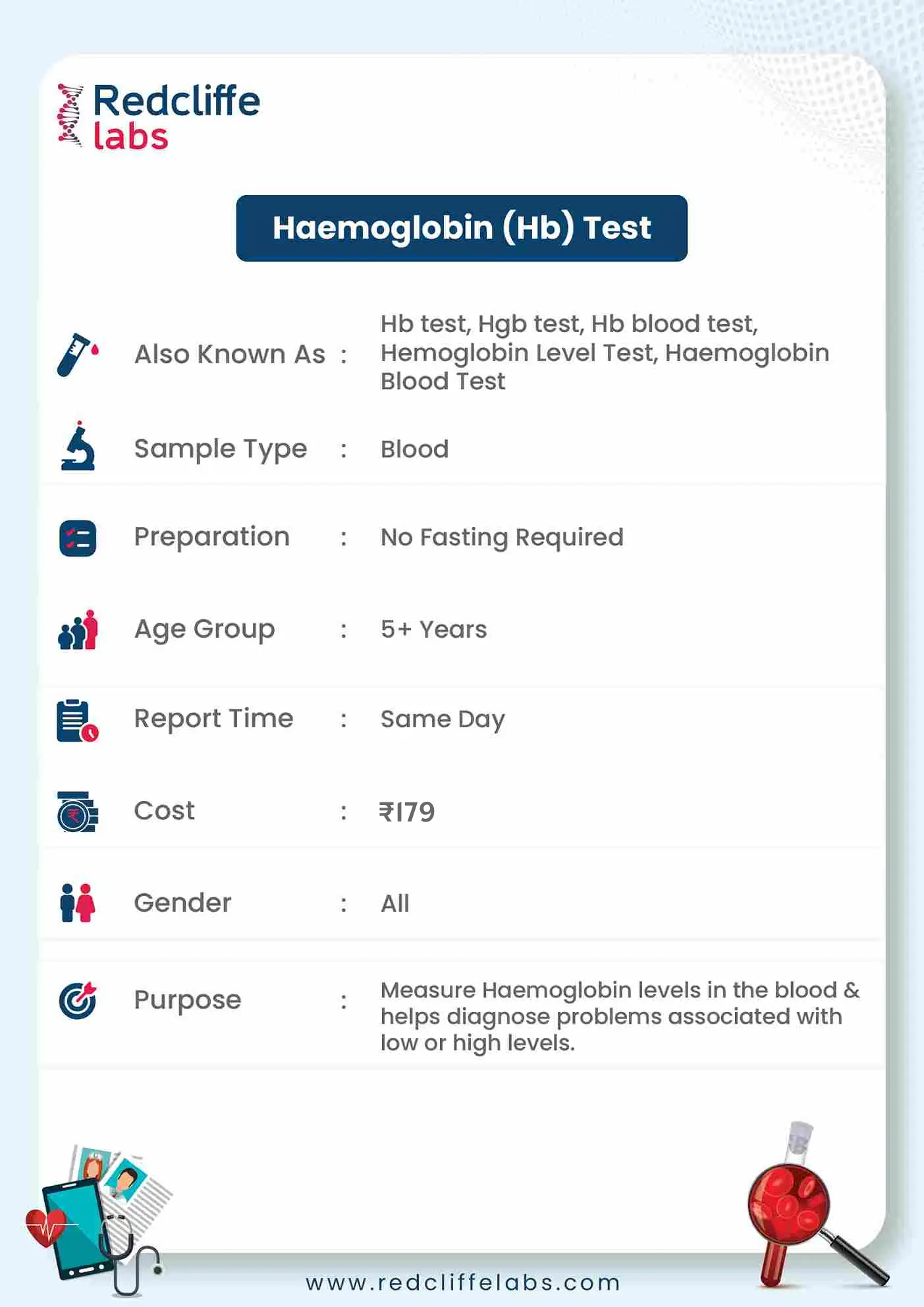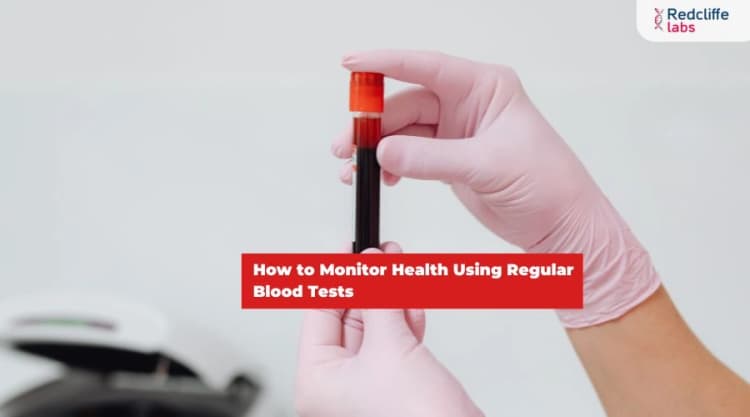The Haemoglobin Test measures haemoglobin concentrat...Read more
Blood
Unlock special
discount on
this package
Login to Unlock 🔓
Also Known As
Hemoglobin Test, Hb Level Test, Blood Hemoglobin Test, Hb Blood Test, hb%test Instructions
NABL Accredited lab*

Booking Benefits Unlocked Worth FREE 799

Report Consultation

Diet Plan
*Available once your report is generated.
At Redcliffe Labs, we have a single goal: to give India its right to quality diagnostics.
Customers served
Tests Processed Everyday
Cities
Collection Centres
World Class In-house Labs
Home Collection Experts
1 Test Parameters
Haemoglobin (Hb)
1 PARAMETER INCLUDED
1 PARAMETER INCLUDED
- Haemoglobin (Hb)
Top Booked Health Checkup Packages
Reports in 12 hours
|Parameters 94
Reports in 12 hours
|Parameters 89
Reports in 12 hours
|Parameters 96
Reports in 12 hours
|Parameters 96
Reports in 12 hours
|Parameters 90
Helps you know your test better
Q. What is Hemoglobin Test?
Q. What is the cost of the Hemoglobin Test ?
Q. Are there any risks associated with Hemoglobin Test?
Q. What is the type of sample required for the Hb test?
Verified by Medical Expert

WRITTEN BY
Komal Daryani

MEDICALLY REVIEWED BY
Dr. Mayanka Seth
Table of Content
Introduction to Haemoglobin (Hb) Test
Haemoglobin is an essential protein in RBCs, carrying oxygen from the lungs to different tissues and organs throughout the body. Having adequate levels of this mighty protein is vital to ensure proper functioning & better health. Too much or too less Haemoglobin can lead to severe health complications. Thus, measuring, monitoring & managing it in time is critical to confirm the problem, whether the levels are high or low, and take preventive measures before things turn ugly.
Doctors often suggest Haemoglobin Test as a part of a complete blood count test to assess overall health status, screen for certain conditions, monitor treatment response & evaluate a person’s ability to carry oxygen efficiently. It provides insight into an individual’s blood health & helps healthcare providers guide appropriate treatment.
Early diagnosis of abnormality in the Haemoglobin Levels enables one to take appropriate treatment & other preventive measures to bring the balance and manage the condition better. Redcliffe Labs, Healthy India Ki Trusted Lab, is your reliable choice for HB Test. With years of experience & expertise in the domain, we help you get tested appropriately from home at a competitive market price.
Haemoglobin (Hb) Test Details In Brief:
| Also Known As | Hb test, Hgb test, Hb blood test, Hemoglobin Level Test, Haemoglobin Blood Test |
| Purpose | Measure Haemoglobin levels in the blood & helps diagnose problems associated with low or high levels |
| Preparation | Do not take any over-the-counter medicine without confirming with your doctor |
| Fasting | No Fasting Required |
| Get Reports Within | Same Day |
| Cost | INR 179 |

What is the purpose of the hemoglobin test?
The purpose of the hemoglobin test is to measure the hemoglobin level in your blood. The level of hemoglobin assesses the ability of the body to carry oxygen. The key reasons why a doctor may suggest a hemoglobin test are:
- To diagnose anemia: A hemoglobin test helps detect anemia. It is a condition where the body doesn’t produce enough healthy red blood cells. Low hemoglobin levels indicate chronic diseases, iron deficiency, or vitamin deficiencies.
- To monitor blood disorders: The test also helps monitor disease progression and treatment effectiveness.
- Assessing Polycythemia: If hemoglobin levels are high, it can indicate polycythemia vera, a condition in which the body produces too many red blood cells. Performing a test helps detect the condition and monitor treatment outcomes.
- Evaluating symptoms: If you show symptoms such as fatigue, weakness, dizziness, or shortness of breath, a hemoglobin test is often ordered.
- Screening for chronic conditions such as kidney or chronic lung disease can affect hemoglobin levels. The test helps monitor the impact of these chronic diseases on your body.
- Monitors nutritional deficiencies: A hemoglobin test helps monitor deficiencies, particularly in the case of poor or malnutrition. In these conditions, hemoglobin levels might drop due to insufficient vitamins and nutrients.
If your doctor has suggested a hemoglobin test depending on your symptoms, get yourself tested. By evaluating hemoglobin levels, your doctor can determine your blood’s hemoglobin-carrying capacity and diagnose various medical conditions.
What are the benefits of a hemoglobin test?
A hemoglobin test offers several benefits, such as:
- Early detection of anemia: A hemoglobin test helps detect anemia early, especially types caused by iron, vitamin B12, or folate deficiencies.
- Monitoring chronic diseases: A test is essential for monitoring kidney, heart, or lung diseases. Regular testing can help monitor disease progression and manage treatment more effectively.
- Assessing blood disorder: A doctor may suggest the test to identify blood disorders such as thalassemia or sickle cell anemia.
- Evaluating overall health: Hemoglobin levels are included in routine health checkups. They deeply analyze the patient’s body’s ability to transport oxygen. They also reveal existing health issues that might not be visible based on symptoms alone.
- Pre-surgical evaluations: Checking hemoglobin levels before surgery helps doctors determine whether the patient has sufficient red blood cells to handle potential blood loss.
- Supporting nutritional assessments: The test finds dietary deficiencies, and addressing them can improve overall well-being and energy levels.
- In short, a hemoglobin test is crucial for diagnosing, monitoring, and preventing diseases and for managing both acute and chronic health conditions.
What does a hemoglobin test detect?
A hemoglobin test detects the amount of hemoglobin. It is an oxygen-carrying protein found in red blood cells in the blood. It is usually recommended to identify a variety of conditions, such as:
1. Low hemoglobin levels can indicate different anemia types, such as:
- Iron deficiency anemia occurs due to insufficient iron or heavy menstrual periods. The condition is common in individuals with malnutrition.
- Chronic disease anemia is linked to patients with prolonged kidney disease, cancer, or infections.
- Vitamin B12 or folate deficiency occurs due to poor absorption of these nutrients.
2. It helps monitor and discover the impact of chronic ailments such as kidney and lung disease.
- Kidney disease: Erythropoietin (EPO) is a hormone that kidneys produce to stimulate the production of red blood cells. High or low levels can lead to health issues. A blood test can help a doctor measure erythropoietin levels.
- Lung disease, such as common obstructive pulmonary disease (COPD), can affect the oxygen level in the blood, which can then influence hemoglobin production.
3. High hemoglobin levels (Polycythemia Vera)
A patient’s body creates too many red blood cells, which increases the risk of blood clots. This is called polycythemia vera.
4. Blood Disorders
A hemoglobin test can also detect blood disorders such as thalassemia and sickle cell anemia.
5. Blood Loss
Apart from this, a hemoglobin test checks for hidden blood loss. This could be due to gastrointestinal issues, ulcers, or heavy menstrual bleeding.
In short, a hemoglobin test gives a healthcare provider crucial insights into the patient’s health. It checks for abnormalities that affect oxygen transportation and red blood cell count.
Symptoms That May Call For Haemoglobin Level Test:
Abnormal Hemoglobin Levels cause different signs & symptoms for every individual, and in some cases, one may experience no symptoms at all, especially at the initial stage. However, some common signs indicating abnormal Hemoglobin Levels and prompting a need for Hemoglobin Test include the following.
Symptoms Of Low Haemoglobin Levels:
- Excessive tiredness or lack of energy, even after adequate rest, is one of the common signs indicating low Haemoglobin.
- Most people with low Haemoglobin may also complain of breathing problems, especially with physical exertion, or in severe cases, it could even be possible at rest.
- The drop in the levels may also cause paleness, especially on the face, nails, & lower eyelids.
- The dizziness or faintness, accompanied by a loss of balance, is also linked with low Haemoglobin levels.
- Pounding or racing heart rate also indicates low Haemoglobin levels that must be diagnosed soon.
- Frequent headaches may also indicate that your Haemoglobin levels are not balanced and may need early diagnosis and timely management.
- Low Haemoglobin may also cause brittleness and dryness of hair and nails, making them more prone to damage.
Symptoms Of High Haemoglobin Levels:
- Frequent headaches that cause pressure-like sensations are usually associated with high Haemoglobin levels.
- Lightheadedness or dizziness is another common sign indicating an imbalance in Haemoglobin levels.
- Difficulty focusing or blurry vision also indicates high Haemoglobin levels that should be controlled in time.
- A sensation of numbness or tingling, especially in hands or feet, is also a sign that you need to get yourself tested at the earliest.
- Unusual pain in the chest or discomfort, mild to severe, may be a sign that you need to check your Haemoglobin levels.
This is not it! Identifying the abnormality is essential for accurate diagnosis. Your doctor may observe your symptoms; if anything unusual is suspected, they may suggest a Hemoglobin Blood Test.

Importance Of Timely Haemoglobin Blood Test:
- Accurately Measure Haemoglobin Levels: Getting Haemoglobin Test done is critical to measure their blood levels appropriately. It helps confirm whether the levels are in balance or have any abnormalities.
- Enable Early Detection Of The Disease: Low or High Haemoglobin is associated with different diseases, and early screening helps with timely diagnosis to catch the disease before complications appear. Moreover, it enables prompt treatment and other preventive measures.
- Assess Oxygen-Carrying Capacity: Haemoglobin has a significant role in carrying oxygen to different organs, tissues & body parts, and abnormalities in their levels can affect its ability to transport oxygen, leading to health problems.
- Monitor Overall Health: Routine Haemoglobin Test has a significant role in keeping a tab on your health & functioning of the body. Changes in Haemoglobin levels indicate abnormalities or underlying medical conditions requiring timely attention for better management.
- Detect & Manage Chronic Conditions: Haemoglobin Levels should be balanced for managing several conditions, like kidney disease, liver disease, or certain cancers. Getting tested in time helps evaluate the impact of these conditions on blood health & make appropriate routine adjustments for better health.
- Guide Treatment Plans: By determining your Haemoglobin levels, the test can influence the treatment decisions and help healthcare providers tailor treatment plans according to your health requirements.
- Track Response To Treatment: Besides enabling doctors to prescribe the correct treatment, the test helps track whether the treatment works effectively fine or requires adjustments.
- Prevent Complications: Early diagnosis of abnormal Haemoglobin helps detect associated diseases, enabling better management of the condition with minimal possible complications.
- Support Overall Well-Being: Adequate Haemoglobin levels are essential for varied bodily functions, and identifying abnormalities, enables us to take proactive steps to optimize levels and improve the quality of health.
Checking Haemoglobin Levels in time with an HB Blood Test is essential to ensure proper evaluation & interpretation based on individual symptoms. So, why wait, and what for? Book your Haemoglobin Test at home with Redcliffe Labs now.
Watch our Video on Low Hemoglobin Causes, Symptoms And Diagnosis
Complications Linked With Abnormal Haemoglobin Levels:
Complications Of Low Haemoglobin Levels:
- Anemia: Low Haemoglobin Levels indicate anemia, which leads to several complications like fatigue, weakness, reduced oxygen-carrying capacity of the blood, etc. It declines the body’s ability to perform physical activities.
- Cold Extremities: Due to reduced Haemoglobin levels in the blood, the blood flow & oxygen levels get restricted or reduced too, leading to coldness in hands & feet.
- Increased Heart Rate: Low Haemoglobin levels are usually associated with anemia, which influences the heart rate. If the condition persists long, it can strain the heart and potentially contribute to heart-related problems.
- Reduced Exercise Tolerance: Low hemoglobin also contributes to decreased stamina and exercise tolerance capacity due to less muscle oxygen supply.
- Complications In Pregnancy: Low Haemoglobin increases risks of preterm birth, low birth weight & other complications during pregnancy.
Complications Of High Haemoglobin Levels:
- Impaired Kidney Functions: Elevated Haemoglobin levels are inappropriate for your kidney and can lead to severe damage and other complications.
- Increased Risk Of Bleeding Disorders: It also influences platelet functions & clotting factors, which increases the likelihood of developing abnormal clotting or other blood disorders.
- Enlarged Spleen Or Liver: Elevated Haemoglobin for a prolonged period can also lead to an enlarged spleen, causing severe pain in the abdominal area.
- Increased Risk Of Strokes & Heart Attacks: These are linked to blood clotting problems, which can block vessels in the brain or heart, causing a stroke or heart attack.
The specific complication & severity of the condition varies for each individual, depending on their symptoms and risk factors. Thus, getting tested in time is paramount to ensure your health isn’t compromised and you get over the condition while there is still time. So, book a Haemoglobin (Hb) Test with us today.
Preparations Required For A Haemoglobin Blood Test:
As the name implies, it is a blood test, so no special preparations are required. However, a general guideline everyone must adhere to includes the following:
- It requires no fasting and can be done anytime, regardless of your last meal. However, in some cases, your diet can influence your results, and you may be asked to follow some dietary restrictions. Thus, it should always be discussed with the healthcare provider before the test.
- Individuals with known underlying conditions and ongoing prescribed or non-prescribed medicines may also be asked to stop them for the time being. However, the decision solely depends and can vary depending on your condition. Do not avoid or take any medicine without consulting with a trained practitioner.
- Avoiding smoking or drinking is also advisable, as these can influence the test results and can cause discrepancies in the test results.
Apart from this, following all their advice & guidelines is equally critical to ensure the test results are consistent.
Procedure Of A Haemoglobin Blood Test:
Some of the common steps involved in the Haemoglobin Blood Test procedure are:
- A phlebotomist may tie a band around your arm and ask you to make a fist; it helps make the vein more visible.
- The second step is to clean the site using a disinfectant. A phlebotomist will clean the area with a cotton ball to prevent infection or allergies.
- Your phlebotomist will then use a sterile needle to draw the blood in significant quantities.
- Once the blood is withdrawn, they will immediately put a cotton ball on the punctured site to prevent bleeding and apply a bandage to protect it against infection.
- The collected blood will then be transferred to a clean vial, easier to carry to the lab for processing, and the reports will be shared with you within a stipulated timeframe.
Although the process is harmless, a little pain or bruise can occur. However, it will be fine in some time. If you think the pain or other symptoms are not fading and you may be experiencing problems, you should seek immediate help from your healthcare provider.

Hemoglobin Normal Level:
The level may vary due to varied factors. However, a general reference range that needs to be considered is
|
Values |
For Males |
For Females |
|
Normal Range |
13.2 to 16.6 g/dL |
11.6 to 15 g/dL |
What do the positive hemoglobin test reports indicate?
A positive hemoglobin test report indicates the patient’s hemoglobin level is below the normal range. It can be either too high or too low.
- Low hemoglobin levels (anemia) can show symptoms such as fatigue, shortness of breath, dizziness, or weakness. It indicates iron deficiency anemia, vitamin B12 or folate deficiency anemia, chronic diseases, and blood loss.
- High hemoglobin levels (polycythemia) can cause symptoms such as headaches, flushed skin, dizziness, and an increased risk of clots. It may also mean you have polycythemia vera, chronic lung disease, or dehydration.
If your hemoglobin levels are abnormal, your healthcare provider may order additional tests. Depending on the underlying cause, treatment may include supplements or a change in dietary habits. Seeking medical assistance is advisable for accurate diagnosis and treatment.
What do the negative hemoglobin test reports indicate?
If your hemoglobin test reports are negative, it typically indicates that your hemoglobin levels are below the normal range of 13.2 to 16.6 g/dL for male adults. For female adults, it is 11.6 to 15 g/dL.This may mean you are suffering from:
- Low hemoglobin is linked with anemia, such as iron deficiency anemia. It is caused by inadequate iron intake or excessive blood loss. It may also mean vitamin B12 or folate deficiency anemia, which is associated with poor absorption of these nutrients. Additionally, low hemoglobin levels are also associated with hemolytic anemia, a condition where the RBCs are destroyed faster than they are made.
Furthermore, leukemia or other bone marrow disorders can lead to low hemoglobin levels.
- A negative hemoglobin test report may also indicate chronic illnesses such as kidney disease, liver disease, or cancer.
Haemoglobin Test Price @ Redcliffe Labs!
Hemoglobin Test Price with Redcliffe Labs is always minimum, enabling us to bring a reliable diagnostic experience to your doorstep at a reasonable cost. HB Test Price is just Rs 179. You can book the test online and get tested comfortably from your home. We also provide Express Slots that help you get your sample picked within 45 minutes.

Haemoglobin (hb) Test Cost in Different Cities
| City Name | Discounted Price |
| Delhi | ₹179 |
| Noida | ₹179 |
| Mumbai | ₹179 |
| Bangalore | ₹179 |
| Kolkata | ₹179 |
| Pune | ₹179 |
| Lucknow | ₹179 |
| Ahmedabad | ₹179 |
| Hyderabad | ₹179 |
| Chennai | ₹179 |
| Gurgaon | ₹179 |
| Jaipur | ₹179 |
| Faridabad | ₹179 |
| Indore | ₹179 |
| Patna | ₹179 |
Take Charge Of Your Well-Being With Routine Haemoglobin Test
Maintaining adequate levels of Haemoglobin is crucial, as is routine testing for measuring the levels. It will help you know the status of your health and act accordingly to improvise it. You can book a Haemoglobin Test with Redcliffe Labs, and our phlebotomist will be at your home as scheduled to help you get tested from home. If you have any other doubts or queries related to the test, price, or more, you can get connected with our representative.
5 Simple Steps to Manage Your Health with Redcliffe Labs
Quick, Simple & Convenient; trusted care delivered to your doorstep.

Start Your Online Booking
Open the Redcliffe Labs website/app. Select the test or package and enter your details. Schedule the service for your preferred slot.

Live Tracking
Stay updated with real-time tracking for a smooth and timely home sample collection.

Sample Collection
Our certified experts ensure a smooth, hygienic, and fully compliant sample collection experience.

Doctor-Verified Smart Reports
Every report is clinically checked by expert doctors and shared with smart, actionable insights.

Your Health Journey Continues Post Reports
Consult with our expert medical team to get actionable insights to improve your health.
Nearby Labs(9)
Redcliffe Labs Noida

MC-5280
Redcliffe Collection Center
Redcliffe Collection Center
Redcliffe Collection Center
Redcliffe Collection Center
Redcliffe Collection Center
Redcliffe Collection Center
Redcliffe Collection Center
Redcliffe Collection Center
Frequently Asked Questions
What does the HB Test mean?
Can a Haemoglobin test detect pregnancy?
Can a Hemoglobin test be done on an empty stomach?
How frequently should a Hemoglobin test be repeated?
What is an average Hemoglobin level?
What foods increase Haemoglobin?
Can I book a Hemoglobin (Hb) Test near me?
Can I book a home collection for a Hemoglobin (Hb) Test?
Health Articles & Blogs
My Health
Stay informed with our expert health articles and blogs. Explore comprehensive guides on diseases, nutrition, preventive care, and wellness tips to help you make better health decisions.
Capsicum (Shimla Mirch) 101: Benefits, Nutritional Value, Uses and More

Normal Calcium Levels: Range, Symptoms & Causes of Imbalance

Home Remedies to Get Rid of Cold in Babies: Safe & Natural Relief for Infants
Discover safe home remedies to get rid of cold in babies. Learn natural and gentle relief methods to ease cough, congestion, and cold symptoms in infants.

How Often Should You Get a Full Body Health Checkup?

Understanding BUN Test Normal Range & Results: High, Low & Normal
Understanding BUN test normal range and results helps evaluate kidney health. Learn what high, low, and normal BUN levels mean and when to get tested.

What Level of Lymphocytes Is Dangerous?

How to Monitor Health Using Regular Blood Tests?

টাইফয়েড কি বাহিত রোগ? – জানুন সবকিছু
Explore My Health
